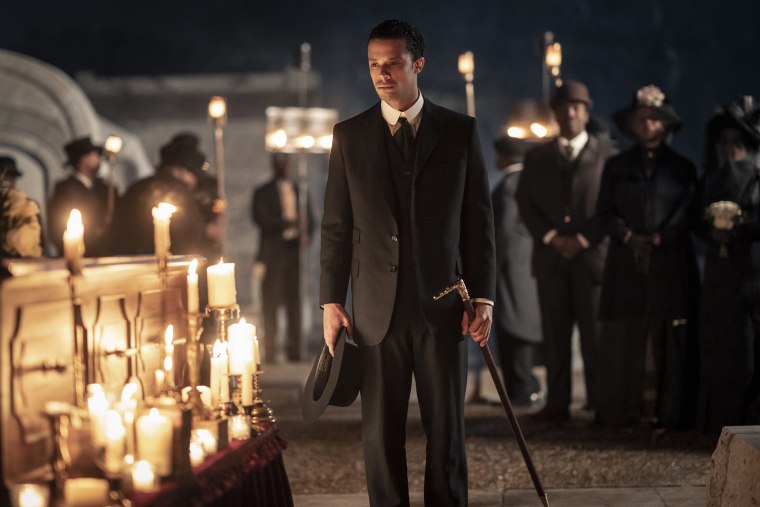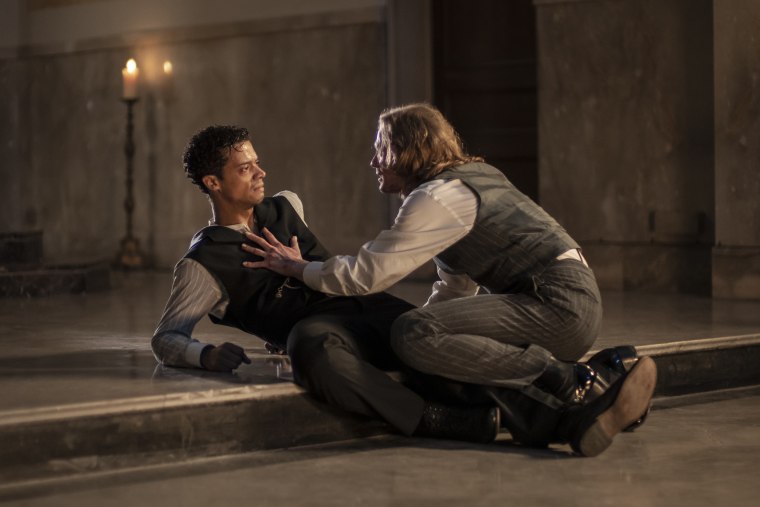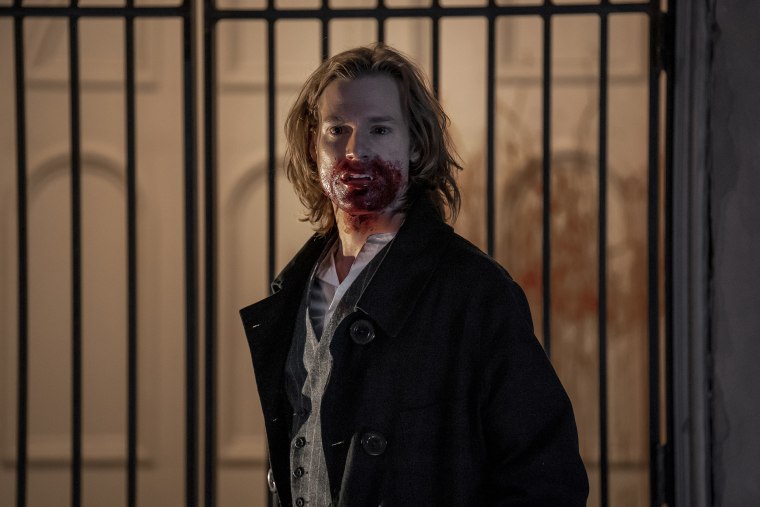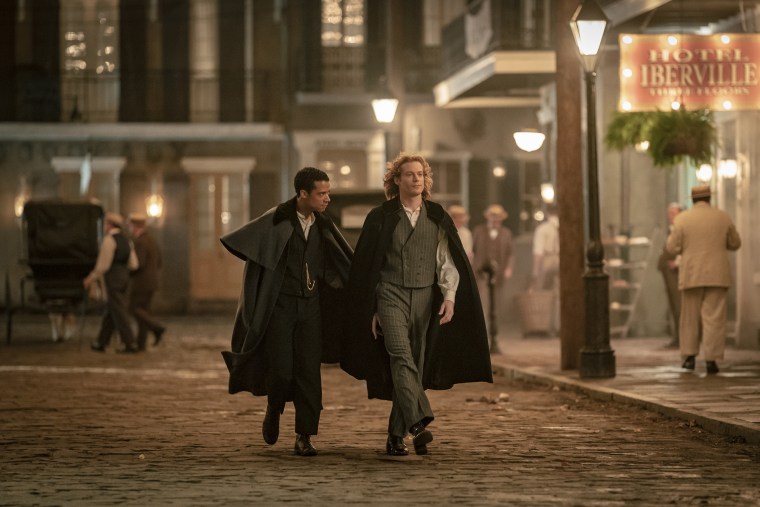Gothic writer Anne Rice’s most famous novel, “Interview With the Vampire,” returns to the screen in a lavish AMC series starring Jacob Anderson and Sam Reid as the dashing vampiric duo, Louis and Lestat. Positioned as a continuation of Neil Jordan’s film adaptation of the novel, the small-screen production delivers the steamy, complicated romance that fans have longed for since Brad Pitt and Tom Cruise glared suggestively at each other in the atmospheric 1994 flick.
“Vampires intrinsically are about yearning and love — immortal love and yearning over the ages,” Reid told NBC News, citing the famous immortals Nosferatu and Dracula as examples. “They’re very emotional, desperate beings who have to survive eternity and don’t usually want to do that alone. When you read Anne Rice, you see that in Louis and Lestat.”
“This is the quintessential vampire story, really,” Reid added. “It’s this yearning and love and intensity, with all of its darkest elements brought to the front, and told over the centuries.”
In the series, from creator Rolin Jones, Louis and Lestat’s centuries-long love affair picks up in 2022, in a world ravaged by the pandemic. Louis (Anderson) once again approaches journalist Daniel Molloy (Eric Bogosian) about recording his story for posterity, after a failed attempt decades before — which ended rather violently for the film’s Molloy, played by Christian Slater. Motivated by curiosity and ambition, the aging journalist signs on to conduct a series of interviews, which constitutes the series’ frame narrative, at the vampire’s cavernous, high-rise residence in Dubai.
Diverging from the novel, here Louis’ tale begins in 1910, when he runs gambling houses and brothels in New Orleans’ French Quarter and acts as the head of a relatively privileged Black Creole family. (Rice’s character, as portrayed by Pitt, is a white Creole plantation owner whose origin story is set in 1791.) Louis’ human existence revolves around his business dealings with the city’s bigoted elite and his close, if contentious, relationship with his siblings (played by Kalyne Coleman and Steven Norfleet). That’s until the mysterious Lestat (Reid) arrives from Europe and brings disaster in his wake.
A series of tragedies — and the men’s suspect relationship — results in Louis being cut off from his pre-Lestat life. That’s when Lestat makes Louis the irresistible offer of wealth, influence and a place by his side — for all eternity.

Louis’ immortal life alongside his seductive and temperamental maker begins with mid-air and coffin-bound lovemaking, as well as explosive disagreements about the ethics of hunting humans for their blood. And, although in love, the mismatched pair find themselves wanting for more like-minded companionship, which leads to Louis convincing the older vampire to turn a young, dying girl, Claudia (Bailey Bass), into their third family member. But Claudia — the role made famous by a pre-teen Kirsten Dunst — only adds fuel to the fire, as she inherits both Louis’ resentful attitude toward immortality and Lestat’s murderous streak.
“There’s something so beautifully domestic about Louis and Lestat in the novels. They have this homeliness, this deep connection that they always come back to, no matter what’s happened,” Anderson said of translating the vampires’ complicated love affair on screen.
“But then they’ll burn each other’s houses down, as well,” Reid interjected, laughing. “It’s vampire love. Murder is our love language.”

Anderson and Reid’s approach to the protagonists’ fiery relationship was very much informed by Rice’s many novels involving the characters, which collectively make up the Lestat-focused Vampire Chronicles series. Reid came to the project as a longtime fan of Rice and the vampire genre, which he said he almost had to push aside in order to approach the role effectively. And Anderson, although he dove deeper into Rice’s work after being cast, also had a healthy grasp of the characters from reading the first few books in the Vampire Chronicles.
“I feel such an affinity with Louis. Although I do love Lestat in the book series, particularly ‘The Vampire Lestat’ on” Anderson said, referencing the second book in the Vampire Chronicles. “There are times that I don’t envy Sam.”
“He’s very complex,” Reid responded, referring to Lestat. “He is a vampire. And he behaves in ways that you would want a vampire to behave — otherwise, you wouldn’t be reading vampire literature or looking at vampires.”

While audiences who are less familiar with Rice’s life and work may be surprised by the show’s portrayal of Louis and Lestat’s relationship — or, as Anderson suggested, perhaps misdiagnose it as a marketing ploy — the seeds for an explicitly queer adaptation of “Interview With the Vampire” were planted decades ago.
The first and most famous novel in the Vampire Chronicles series was published in 1976, when Rice was mourning the loss of her 5-year-old daughter, one of her two children with poet Stan Rice. While the book failed to impress critics, it became an immediate commercial success, in large part because of its popularity among gay readers, who responded to the the seemingly queer-coded domestic plotline and erotic dialogue.
While the author initially said the subtext hadn’t been intentional, she never dismissed the readings and, over the years, even confirmed the characters’ queerness on multiple occasions. In a 2012 interview, she called Louis and Lestat the “first vampire same-sex parents.” And she later said that Claudia was likely unconsciously inspired by her daughter, while she and Stan were the inspirations for her vampire fathers.

Notably, while Rice was not involved with the film adaptation and even openly criticized some of its creative choices, including Tom Cruise’ casting, she was slated to be a producer on the AMC series before her death in late 2021. (Her son, Christopher, who is also an accomplished writer, stepped in as her representative after her passing.) Despite Rice not living to see the series completed, its stars said they felt confident from the beginning that Jones’ creation lived up to the author’s rich legacy.
“Reading the script for the first time, even before I was attached to it, I could tell that it was the right approach to the material. You could really feel that there was a huge amount of respect for the books and what she was trying to say,” Reid said, referring to Rice. “And the lightness, the humor, the love story, the drama, the absurdity — all of that’s there.”
Although Jones’ version stays true to Rice’s novels in many ways, including in the portrayal of Lestat — who was characterized in the “Interview With the Vampire” novel as a bisexual and “tall, fair-skinned man with a mass of blond hair and a graceful, almost feline quality” — it does deviate in ways that will likely appeal to contemporary viewers. For one, in Rice’s world vampires couldn’t physically have sex, which is certainly not the case in the series. And, most significantly, there’s the recasting of Louis as a Black man.
Rather than taking the approach of color-blind casting, Jones reframes the story so that Louis, who begins immortal life at the beginning of the 20th century, is dealing with the racism and limitations of the eras through which he lives. This, Anderson points out, brings another dimension to this character’s defining struggle with immortal life.
“Because Louis’ central preoccupation is his humanity — and what he still retains from it and what he’s lost from it — if you cast him as a person of color but then don’t factor in his race, then that would read as phony,” Anderson said. “I don’t really see what the point would be.
“There are examples of colorblind casting where it’s a fantasy character and you don’t need to go there. But, because Louis’ ‘human-ness’ is so central to him, I wouldn’t have wanted to do it if we weren’t going to bring the real world into it in that way.”
Jones’ commitment to crafting a realistic world for Rice’s fantastical characters is also seen in the series’ rich aesthetic presentation. From Louis’ artfully decorated apartment, befitting a century’s worth of wealth building, to the opulent rooms of the vampires’ French Quarter mansion, the series’ backdrops are almost as evocative as its actors.
“The characters are intrinsically linked to the city. You walk around the French Quarter and you hear an Anne Rice tour every 100 meters. So it was incredibly important to everyone that New Orleans remained this character,” Reid said, describing the city’s role in the series almost as if it were an actor.
“Mara [LePere-Schloop], the designer, created these beautiful sets. I mean, they were just stunning. When I walked into the Rue Royale set for the first time, my legs buckled,” he added, referring to the street on which the vampires’ luxurious home resides. “It was incredibly transportive.”
During filming, the actors lived in Rice’s beloved hometown for about six months, soaking up the city’s infamous late-night culture while depicting her nocturnal creatures.
“If you’re gonna live anywhere in the country, that’s where you want to live at night,” Reid said.